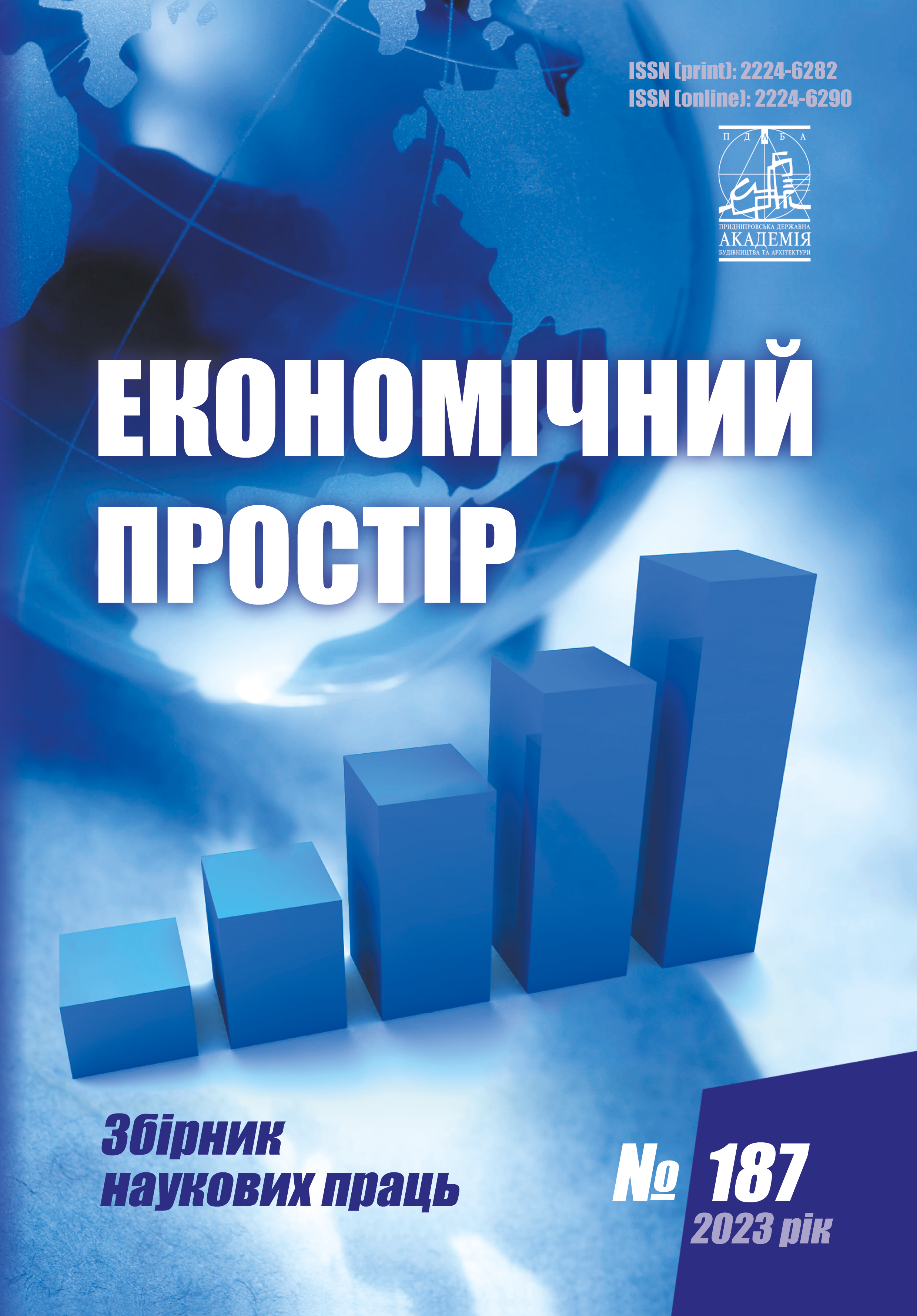OFFICE EXPENSES IN THE CONTEXT OF MODERN APPROACHES TO COST ACCOUNTING
Abstract
The term "office" has long since become one of the most common characteristics of the 21st century economy. Everyone has offices, from a construction organization to an advertising company, from a huge factory with thousands of employees to a small firm with barely ten employees. The functioning of the office is one way or another expenses, and they are very diverse, which determines certain accounting features of them. The article reveals and highlights the specific features of office expenses that must be taken into account when forming an accounting policy, which will allow for the formation of a fairly rational accounting system. These features are: the specifics of regulatory regulation, the significant share of office expenses in total expenses, the variety of these expenses, special approaches to their qualification. It is noted that the office building can be accounted for as one object of fixed assets, or as a set of individual objects of fixed assets or low-value non-current material assets. It is emphasized that the office building can be divided into several objects during its operation. As for office stationery, here the order of displaying costs for its purchase in accounting depends on the term of its operation. Computers, printers, faxes, telephones and other equipment of a similar nature are usually integral attributes of any office. All of them belong to classic non-current assets, as they are operated for more than one year. Their accounting largely depends on their value and on the accounting policy of the business entity. Tax accounting of income tax for office expenses mostly does not contain special nuances. Differences with large payers can arise mostly, either in the case of fixed assets or intangible assets, or if there was an acquisition from risky counterparties. There is no doubt about the economic nature of office expenses. The exception is the so-called dual-purpose equipment, for example: refrigerators, kettles, microwave ovens, coffee makers, heaters, air conditioners, as well as various decorative objects, for example: flowers, trees, aquariums with fish, green spaces.
References
Журавський В.С., Родіонов М.К., Жиляєв І.Б. Україна на шляху до інформаційного суспільства / за заг. ред. М.З. Згуровського. Київ : ІВЦ «Видавництво "Політехніка"», 2004. 484 с.
Згуровський М.З. Розвиток інформаційного суспільства в Україні: правове регулювання у сфері інформаційних відносин. Київ : НТТУ «КПІ», 2006. 542 с.
Havrylenko N. An analytical support methodology for transformational processes. In: Digital Technologies in the Contemporary Economy. Vilnius: Mykolas Romeris University, 2022, p. 186–197. URL: www.cutt.ly/e86kkxU
Гавриленко Н., Грищенко О., Козіцька Н. Вплив цифрових трансформацій на зміст фіскального адміністрування. Економіка та суспільство. 2022. № 41. DOI: https://doi.org/10.32782/2524-0072/2022-41-38
Гавриленко, Н., & Козіцька, Н. (2022). Аналітичне забезпечення цифрових трансформацій. Економіка та суспільство. 2022. № 38. DOI: https://doi.org/10.32782/2524-0072/2022-38-38
Martynovych Nataly, Boichenko Elina, Vivchar Oksana, Myskova Nataliia, Popovych, Oksana, Kasianenko Oksana. Formation of Educational Level of the Population of Ukraine in the Conditions of Formation of Information Society. International Journal of Engineering and Advanced Technology (IJEAT). 2019. Volume-9 Issue-1. Р. 6406–6410. DOI: https://doi.org/10.35940/ijeat.A2205.109119
Polishchuk, О., Kulinich, Т., Martynovych, N., Popova, Yu. (2022), "Digitalization and sustainable development: the new covid-19 challenge requires non-standard solutions", Problemy Ekorozwoju, No. 17(2), Р. 69–79. DOI: https://doi.org/10.35784/pe.2022.2.08
Несторенко Т.П. «Економіка суперзірок»: можливості та загрози для сфери освіти. Український журнал прикладної економіки. 2020. Том 7. № 2. С. 8–15. DOI: https://doi.org/10.36887/2415-8453-2020-2-1
Nestorenko, T. (2022). Digitalization and information society. Selected issues. Series of monographs Faculty of Architecture. Civil Engineering and Applied Arts University of Technology, Katowice Monograph. P. 53.
Новіцький А.М., Новіцька Н.Б., Позняков С.П. та ін. Електронний банкінг (організаційно-правове забезпечення) : монографія. Ірпінь : НУДПС України, 2008. 274 с.
Проект плану відновлення України. Матеріали робочої групи «Діджиталізація». URL: https://www.kmu.gov.ua/storage/app/sites/1/recoveryrada/ua/digitization.pdf (дата звернення: 05.10.2023).
Питання Міністерства цифрової трансформації: Постанова Кабінету Міністрів України від 18 вересня 2019 року № 856. URL: https://ips.ligazakon.net/document/kp190856?an=1&ed=2023_08_25 (дата звернення: 05.10.2023).
Про електронні документи та електронний документообіг : Закон України від 22.05.2003 № 851-IV /Верховна Рада України. URL: https://ips.ligazakon.net/document/T030851?an=936792 (дата звернення: 05.10.2023)
Zhuravskyi V. (2004) Ukraina na shliakhu do informatsiinoho suspilstva.[Ukraine is on the way to an information society]. Kyiv: Politekhnika. P. 484. (in Ukrainian)
Zghurovskyi M. (2006). Rozvytok informatsiinoho suspilstva v Ukraini: pravove rehuliuvannia u sferi informatsiinykh vidnosyn [Development of information society in Ukraine: legal regulation in the field of information relations]. Kyiv: NTTU "KPI". P. 542. (in Ukrainian).
Havrylenko N. (2022). An analytical support methodology for transformational processes. In: Digital Technologies in the Contemporary Economy. Vilnius: Mykolas Romeris University, p. 186–197. Available at: www.cutt.ly/e86kkxU
Havrilenko N., Hryshchenko O., Kozitska N. (2022). Vplyv tsyfrovykh transformatsii na zmist fiskalnoho administruvannia [The influence of digital transformations in the content of fiscal administration] Economy and Society, vol. 41. DOI: https://doi.org/10.32782/2524-0072/2022-41-38
Havrilenko N., Kozitska N. (2022) Analitychne zabezpechennia tsyfrovykh transformatsii [Analytical support Digital transformation]. Economy and society, vol. 38. DOI: https://doi.org/10.32782/2524-0072/2022-38-38 (in Ukrainian)
Martynovych Nataly, Boichenko Elina, Vivchar Oksana, Myskova Nataliia, Popovych, Oksana, Kasianenko Oksana (2019). Formation of Educational Level of the Population of Ukraine in the Conditions of Formation of Information Society. International Journal of Engineering and Advanced Technology (IJEAT), Volume-9 Issue-1. Р. 6406–6410. DOI: https://doi.org/10.35940/ijeat.A2205.109119
Polishchuk, О., Kulinich, Т., Martynovych, N., Popova, Yu. (2022), "Digitalization and sustainable development: the new covid-19 challenge requires non-standard solutions", Problemy Ekorozwoju, vol. 17(2), pp. 69–79. DOI: https://doi.org/10.35784/pe.2022.2.08
Nestorenko, T.P. (2020). «The superstar economy”: opportunities and threats for education». Ukrainian Journal of Applied Economics, vol. 7, no 2, pp. 8–15. DOI: https://doi.org/10.36887/2415-8453-2020-2-1
Nestorenko, T. (2022). Digitalization and information society. Selected issues. Series of monographs Faculty of Architecture. Civil Engineering and Applied Arts University of Technology, Katowice Monograph. P. 53.
Novitskyi A.M., Novitska N.B., Pozniakov S.P. (2008). Elektronnyi bankinh (orhanizatsiino-pravove zabezpechennia): monohrafiia. Irpin: NUDPS, 274 р. (in Ukrainian)
The project of the recovery plan of Ukraine. Materials of the "Digitalization" working group. Available at: https://www.kmu.gov.ua/storage/app/sites/1/recoveryrada/ua/digitization.pdf
Issues of the Ministry of Digital Transformation: Resolution of the Cabinet of Ministers of Ukraine dated September 18, 2019, 856. Available at: https://ips.ligazakon.net/document/kp190856?an=1&ed=2023_08_25
On electronic documents and electronic document management: Law of Ukraine dated May 22, 2003, 851-IV. Verkhovna Rada of Ukraine. Available at: https://ips.ligazakon.net/document/T030851?an=936792



